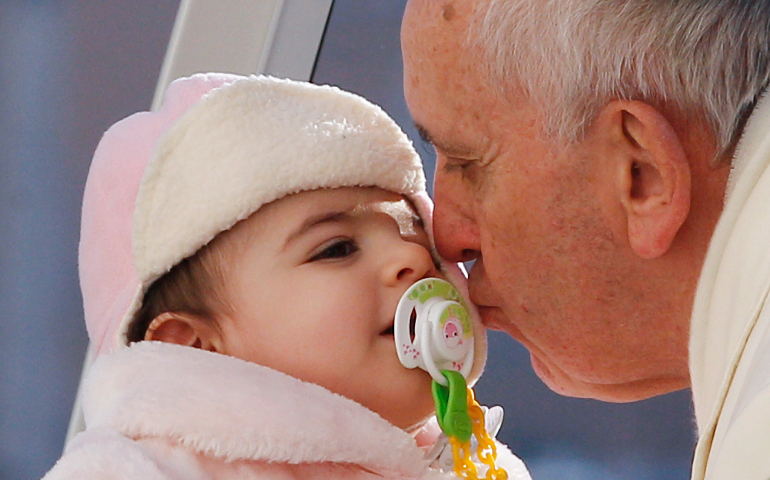
Pope Francis kisses a baby during a general audience in St. Peter's Square Dec. 18, 2013. March 13 marked the fourth anniversary of the Argentine cardinal's election as pope. (CNS/Paul Haring)
My heroes are not kings. Or presidents. Or popes.
For one thing, I am more apt to embrace female role models; but beyond that, as someone who naturally questions authority, I tend to be suspicious of anyone in power. And as a feminist Catholic, I rarely find support for that cause from bishops, the Vatican or popes — even Pope Francis, who despite his less hierarchal style, is less open on women’s issues than on other ones.
So, it’s true that I have been slow to join the Francis Fan Club, even admitting during the conclave that part of my spiritual journey has involved getting to a place where I don’t let what a pope does, or doesn’t do, bother me too much.
But, four years into this papacy, the election of a very different kind of leader to the presidency of the United States has enkindled in me a newfound appreciation for our spiritual leader.
I can only imagine the despair I might be feeling if both the church and the current political majority were attacking the issues about which I care deeply at the same time. Instead, reports from Rome are a welcome antidote to the news from Washington.
For example:
- When President Donald Trump implies most Mexican immigrants are “bad hombres,” or compares refugees escaping persecution and war to terrorists, Francis reminds us to “welcome the stranger” and even insists that “a person who thinks only of building walls, wherever it may be, and not of building bridges, is not Christian.”
- When Trump blasts climate change as a “hoax” created by the Chinese, and his administration dismantles regulations designed to protect the environment, I can instead read “Laudato Si’,” the pope’s encyclical on the environment in which he urges us to hear “both the cry of the earth and the cry of the poor.”
- Speaking of the poor, Trump has said recipients of welfare are “out of control” and has indicated they need to get “back to work” (despite studies that show most households receiving assistance are headed by a working adult). Meanwhile, the pope encourages us to give to the homeless, without worrying how it will be spent.
- While Trump’s replacement of the Affordable Care Act would reward higher-income folks and insurance companies at the expense of older and poorer Americans, the pope instead argues that health care is a right, not a consumer good. Last May, he told a gathering of medical missionaries that “access to health services cannot be a privilege.”
- And, while Trump has proposed a massive increase in military spending, the pope, in his remarks to the U.S. Congress during his visit in 2015, urged lawmakers to “minimize and, in the long term, to end the many armed conflicts in the world,” noting that the sale of deadly weapons is “drenched in blood, often innocent blood.”
It’s clear that, on many issues, the content of their remarks and priorities couldn’t be more different. But their styles also are polar opposite. Trump, flashy and bombastic, is self-centered to the point of narcissism. Francis is humble in both words and action, performing some of his most selfless acts away from the media spotlight.
Some, including Catholic author James Carroll, have called Francis the “anti-Trump.” Writing in the The New Yorker in February, Carroll asks “Who would have thought that, on an elemental point of liberal democracy, the United States could take instruction from the white-robed man in Rome?”
An article a month later in The New York Times poses the Francis-as-anti-Trump headline as a question rather than an assertion, but comes to a similar conclusion. Author Austen Ivereigh contrasts the two populist leaders and concludes that Francis is “a bridge maker in an age of wall building” and notes that “in part because [the pope] anticipated the current political crisis long before it happened, his Greek-chorus commentary on the upheavals matters.”
My heroes — or “sheroes” — are still more likely to be working people rather than kings, grassroots activists rather than presidents, and women religious rather than popes. But if you asked me to pick between the leader of our country and the leader of our church, it’s no contest.
[Heidi Schlumpf teaches communications at Aurora University and is the author of Elizabeth Johnson: Questing for God.]
